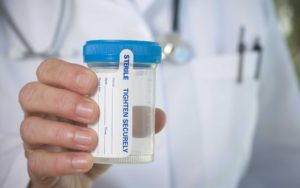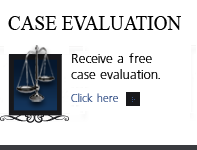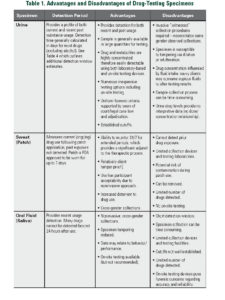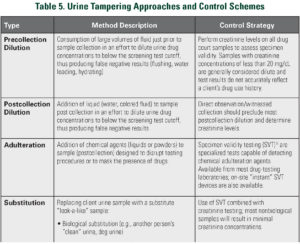




Colorado Probation Violations – Trying To Beat The Urinalyses (UA) – A Losing Proposition In Most Cases
By H. Michael Steinberg Colorado Drug Crimes and Probation Violation Criminal Defense Lawyer

Colorado Probation Violations – Trying To Beat The Urinalyses (UA) – A Losing Proposition In Most Cases
Colorado Probation Violations – Trying To Beat The Urinalyses (UA) – A Losing Proposition In Most Cases – Urine screens are common to almost all sentences to probation in Colorado especially in designated drug courts such as the Denver Drug Court. The impulse to try to “beat” these screens is strong. This article looks at drug screens and how they work.
The punishment for positive drug tests include sanctions such as the loss of probation, program expulsion, jail or even prison in some cases.
Drug Testing Common In Almost All Sentences To Probation In Colorado
Drug Testing for those placed on probation – especially in DUI cases – is a standard condition of probation even if the testing are not specifically ordered by a Colorado Judge at sentencing.
The rules of probation – (that you will read and sign if you are placed on probation in Colorado) – state specifically that you are not allowed to consume any drugs that are not doctor prescribed.
Urine screens (UA’s) – while not the most accurate of measures for drug usage (see below) – are the primary method for checking on the illegal usage of drugs.
Colorado’s Drug Courts – Such As Denver’s Drug Court Requires Many Urine Screens
Colorado Drug Courts typically use a Phase system for each level of supervision in the program.
Every Phase has a requirement of drug testing as follows:
The Phase system is comprised of three phases plus graduation:
Phase I requires the offender to submit to a minimum of 8 urine screens per month (averaging 2/week).
Phase II requires the offender to submit to at least 4 urine screens monthly.
Phase III requires the offender to submit to a urine screen on average every 3-4 weeks.
Phase IV requires the offender to submit to a urine screen on average every 3-4 weeks.
When a Drug Court participant agrees to the treatment regiment of drug court they sign a kind of “contract” as regards drug testing. The contract has certain understandings relevant to this article. Those promises as to drug testing rules usually follow along these lines:
I understand I will be tested for the presence of alcohol and other drugs in my system on a random basis according to procedures established by the drug court team and/or my treatment provider.
I understand that I will be given a location and time to report for my test.
I understand that it is my responsibility to report to the assigned location at the time given for the test.
I understand that if I am late for a test, or miss a test, it may be considered as a positive test for alcohol or other drugs and that I may be sanctioned.
I understand that if I fail to produce a urine specimen or if the sample provided is not of sufficient quantity, it may be considered as a positive test and that I may be sanctioned.
I have been informed that the ingestion of excessive amounts of fluids can result in a diluted urine sample, and I understand that my urine sample will be tested to ensure the sample is not diluted.
I understand that if I produce a diluted urine sample it may be considered as a positive test for alcohol or other drugs and that I may be sanctioned.
I understand that substituting or altering my specimen or trying in any way to modify my body fluids or other specimens for the purposes of changing the drug-testing results will be considered as a positive test for drugs/alcohol and will result in sanctioning and may be grounds for immediate termination from drug court.
Why Is Drug Testing Required? – What Are Your Probation Officer’s Expectations?
It is – as a policy based matter – believed that Drug Testing:
…. Provides a deterrent to future drug usage—a therapeutic tool as participants develop and refine their coping and refusal skills aimed at rejecting new drug use opportunities;
…. Identifies clients who are remaining abstinent and guides incentives or rewards;
…. Identifies drug court participants who have relapsed, allowing for
(1) rapid intervention and
(2) effective utilization of finite court resources by targeting those participants who most need assistance;
…. Provides incentive, support, and accountability;
…. Serves as an adjunct to treatment.
How UA Drug Testing Works
Drug based UA testing in Colorado typically falls under three or four varieties:
The 5-Panel Test,
The 7-Panel Test
The 8-Panel Test
The 10-Panel Test.
Most UA’s – if your crime was a DUI or a drug related misdemeanor or felony or there is another reason – (such as the facts of the case) use the 7-Panel test.
The 7-Panel test searches for 7 different drugs:
• Cannabinoids (THC)
• Amphetamines (and Methamphetamines)
• Cocaine
• MDMA (Ecstasy)
• Opiates
• Heroin (6-Monoacetyl Morphine)
• Phencyclidine (PCP)
Today, if you are arrested for Driving Under The Influence Of Drugs (DUID) many Colorado drug testing facilities now include a test for synthetic marijuana (SPICE) and these facilities may actually use a 8 or 10-Panel test. You should always know WHAT DRUGS are screened in your specific case.
Understanding The Scientific Options For Taking Specimens For Drug Testing
It is well known that there is no “perfect” drug-testing specimen. Drug testing is an inexact science. The chart below explains the advantages and disadvantages of each type of test.
Advantages and Disadvantages of Drug-Testing Specimens
Urinalysis remains the gold standard for repeated drug testing in the context of Drug Court or other forms of drug probation sentences. Nearly all of the published scientific literature associated with drug testing has been established with urinalysis.
While urinalysis is still the specimen of choice for drug testing, – other specimens such as sweat, oral fluids, and hair are accepted as alternative specimens for criminal justice applications.
In some courts these alternative specimens are acknowledged to have reduced susceptibility to tampering and eliminate the need for what can only be described as the humiliation of direct observation of collections
Click on Image to enlarge- then again on next page:
The Use Of Synthetic Urine To “Beat” The Colorado UA Test
Synthetic urine, readily available in Colorado. It is used to attempt to defraud probation and parole officers and even drug courts for unscheduled “random” UA. The most basic UA, as opposed to more thorough tests (above) looks for 5 substances:
THC (the active ingredient in marijuana),
Amphetamines (speed or meth),
Cocaine,
Opiates (heroin, morphine or codeine) and
Phencyclidine (PCP or angel dust).
Because residual THC remains in your system for many weeks and sometimes even months after use “inactive” THC – even after stoppage – will show up in your urine test. While blood is the most accurate method of testing for “active” THC – as in Driving Under The Influence of Marijuana cases, it is not practical financially and for reasons related to the intrusiveness of the method of obtaining a sample -(sharp needles) for random and routine drug tests.
THC takes weeks to work its way out of the body, so … people on probation will try to successfully use a “detox product” to “flush THC out” of their body. Another method is to try to “dilute” their urine by drinking lots of water before the test.
Because of recent advances in drug testing – all of these methods will usually fail.
Taking fake urine to a supervised drug test requires trying to conceal it, warming it to body temperature and then placing the “fake” urine into the specimen bottle.
If the fake urine is discovered during a search before the test, if the specimen is too hot or too cold, if the technician sees or hears the substitution take place – the parolee – or probationer goes back to jail.
Click on Image to enlarge – then again on next page:
The basic urine tampering approaches and control strategies.
The trend is to obtain “oral specimens” which are harder to cheat – are not susceptible to substitutions can be taken without a violation of privacy and cannot be diluted or flushed in any way. The problem with oral testing is that it cannot detect longterm use of marijuana.
Failing Your First – Or Even Your Second UA Drug Test
I receive many calls from individuals who “know” they are going to fail their first UA. They can rest assured that the first drug screen is called the “baseline” drug test and even if it is hot – as long as the next test shows a substantial decrease – there is almost never a punishment for failing that test – and with some probation – parole officers – maybe even the second test.
Attacking The Drug Testing Method
For a drug detection method to be acceptable it has to meet at least three criteria.
Drug tests must be:
1. Scientifically valid – (they must utilize methods that employ proven technologies accepted by the scientific community and must be evaluated in peer-reviewed journals);
2. Legally defensible – (they must be able to withstand legal challenge and have an established court track record that has undergone legal/judicial scrutiny);
3. Therapeutically beneficial – (they must be able to provide an accurate profile of clients’ drug use, produce rapid results for appropriate court responses, and quick treatment intervention as required to change behavior and support recovery).
A Two Step Process – “Presumptive Positive” and “Confirmation”
Most forensic drug-testing labs will use a 2-step analysis for a UA. The first step is called “screening” and is designed to differentiate samples that contain no detectable drugs from those samples that produce a reaction in the “initial testing phase.”
The screening phase can be performed on-site using rapid test devices or instrumentation.
“Hot” UA’s are called “presumptively positive.”
It is well known that “false positives” are all too common in UA testing because many substances are “chemically similar” to others. Therefore it is necessary for a step 2 to validate positive screening results to rule out false positives by performing a “confirmation procedure.”
The confirmation procedure is used to re-analyze the suspected hot UA by double-checking the result using a second, different test to ensure that the first test was accurate. A test called gas chromatography-mass spectrometry or GC-MS provides a “chemical fingerprint” that identifies the drug and is considered the definitive confirmation technology in today’s world.
If a person on probation denies the use of the suspected presumptively positive drug, the only fair way to proceed further is for a drug lab to confirm or exclude a presumptively positive test for the suspected drug. Because of so called “cross activity” issues from OTC medications, poppy seeds, homeopathic preparations, vitamins, or supplements – a confirmation process is critical to the fairness of drug testing on the person being tested.
The scientific rationale for discouraging the use of urine drug levels is both technical (issues associated with the testing methodologies) and physiological (how the human body processes drugs).
The Creatinine Issue – Why Sample Tampering By Drinking Water Can Hurt Your Case
The dilution of the urine sample is by far the most common type of tampering technique. The courts combat this kind of tampering by including a test for a substance called creatinine.
Most programs use “witnessed sampling” as a measure to combat tampering – but today because synthetic urine fraud is becoming more common and the witness can be defrauded – nearly all urine samples are also tested for creatinine.
Essentially creatinine is a biological waste material produced by metabolism and measuring creatinine determines the strength or concentration of a client’s urine sample. A dilute urine sample (with creatinine levels less than 20 mg/dL) is not a “normal” occurrence. Thus urine samples that yield a creatinine concentration of less than 20 mg/dL is most often considered a dilute sample.
When a specimen is “diluted” (more like water than urine), the test cannot detect the presence of drugs that may be present because the drugs have been diluted to a point below the cutoff of that assay.
A 2005 study that assessed over 22,000 subjects (with urine samples taken from adults and children, different ethnic groups, and at various times throughout the day) determined that the average, normal urine creatinine in the U.S. is 130 mg/dL.
Most probation officers will treat repeat dilute samples as “hot” or failed UA’s.
For someone attempting to “beat” the UA by dilution – they will typically rapidly (over a period of 60 to 90 minutes) drink two to four quarts of water or other liquid beverages. With that much liquid creatinine levels of less than 20 mg/dL will result.
Other variables impacting the presumption of “dilution” include a person’s metabolism, the amount of fluids regularly consumed, and dietary habits. Still other factors include taking a closer look at individuals who work outside (construction workers) in hot, summer weather and ingest large amounts of fluids.
Also notably, rapidly changing and significantly high and low urine creatinine levels from day to day sample to sample are usually interpreted by the authorities as possible specimen tampering. Normal urine creatinine mixed with low levels on other occasions usually means there are no disease-related problems to factor in.
Here is the bottom line – PO’s and Judges will try to punish Defendant’s who are perceived as trying to “beat the UA.” The loss of probation, jail, or even lengthy extensions of probation which may include repeating treatment from the beginning – are also possible sanctions and the person seeking to defraud the test may want to consider the downside of the decision.
Colorado Probation Violations – Trying To Beat The Urinalyses (UA) – A Losing Proposition In Most Cases
If you found any of the information I have provided on this web page article helpful please click my Plus+1 or the Share buttons for Twitter and Facebook below so that others may also find it.
The reader is admonished that Colorado criminal law, like criminal law in every state and at the Federal level, changes constantly. The article appearing above was accurate at the time it was drafted but it cannot account for changes occurring after it was uploaded.
If, after reading this article, you have questions about your case and would like to consider retaining our law firm, we invite you to contact us at the Steinberg Colorado Criminal Defense Law Firm – 303-627-7777.
Never stop fighting – never stop believing in yourself and your right to due process of law. You will not be alone in court, H. Michael will be at your side every step of the way – advocating for justice and the best possible result in your case. H. Michael Steinberg is passionate about criminal defense. His extensive knowledge and experience of Colorado Criminal Law gives him the edge you need to properly handle your case
 ABOUT THE AUTHOR: H. Michael Steinberg – Email The Author at [email protected] – A Denver Colorado Criminal Defense Lawyer – or call his office at 303-627-7777 during business hours – or call his cell if you cannot wait and need his immediate assistance – please call 720-220-2277.
ABOUT THE AUTHOR: H. Michael Steinberg – Email The Author at [email protected] – A Denver Colorado Criminal Defense Lawyer – or call his office at 303-627-7777 during business hours – or call his cell if you cannot wait and need his immediate assistance – please call 720-220-2277.
“A good criminal defense lawyer is someone who devotes themselves to their client’s case from beginning to end, always realizing that this case is the most important thing in that client’s life.”
You should be careful to make a responsible choice in selecting a Colorado Criminal Defense Lawyer. We encourage you to “vet” our firm. Over the last 40 plus years – by focusing ONLY on Colorado criminal law – H. Michael has had the necessary time to commit to the task of constantly updating himself on nearly every area of criminal law, to include Colorado criminal law and procedure and trial and courtroom practice. H. Michael works hard to get his clients the best possible results in and out of the courtroom. He has written, and continues to write, extensively on Colorado criminal law and he hopes this article helps you in some small way – Colorado Probation Violations – Trying To Beat The Urinalyses (UA) – A Losing Proposition In Most Cases.
Other Articles of Interest:
- Colorado Probation Revocation Violations Based On Drug Use -The Hot UA Problem
- Colorado’s Probation Violation Hearing Law – Analysis
- Protecting Yourself While On Colorado Probation – Some Tips
- Colorado Probation Violations – The “Revoke And Terminate” Probation Option














